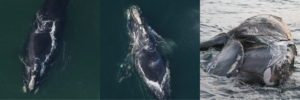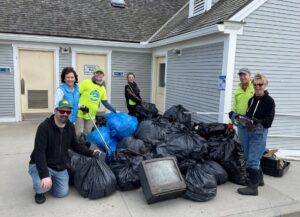
Images of female right whale “Bayla” (Catalog #3911) before and after being entangled in fishing line, passing away at the age of two. CREDIT: Florida Fish and Wildlife Conservation Commission, taken under NOAA research permits #594-1759 and #932-1905/MA009526
HYANNIS – A recent study by scientists from the New England Aquarium and Duke University has found that entanglements in fishing gear are the leading cause of injury and death for North Atlantic right whales.
Experts said that could have grave implications for their long-term survival.
The study, published in Conservation Science and Practice, tracked the outcomes of 1,196 entanglements involving 573 right whales between 1980 and 2011, ranking them based on severity and finding fishing entanglements to be even more deadly than previously thought.
Fishing entanglements were correlated with serious injuries and adverse outcomes, even in instances where the whale freed itself of the fishing gear with which it became entangled, leaving scars as evidence.
The study also found that the sub-lethal effects of entanglement were more pronounced than previously believed, with birth rates decreasing among female right whales who suffered severe injuries in an entanglement.
To make matters worse, the rate of serious entanglements has increased as fishing has expanded and fishing ropes have been strengthened.
The findings highlight a difficult path to recovery for the critically endangered marine mammals, whose numbers continue to dwindle in the wild.
“If we are going to save right whales from imminent extinction, dramatic changes to how fixed fishing gear activities are presently conducted are needed,” said lead author Amy Knowlton, a senior scientist at the New England Aquarium.
“We believe these changes will require support from both the U.S. and Canadian governments to help the fishing industry transition to gear that will allow the industry to operate in a manner that is safer for whales and other marine species.”
To view the study, click here.
By, Matthew Tomlinson, CapeCod.com NewsCenter























